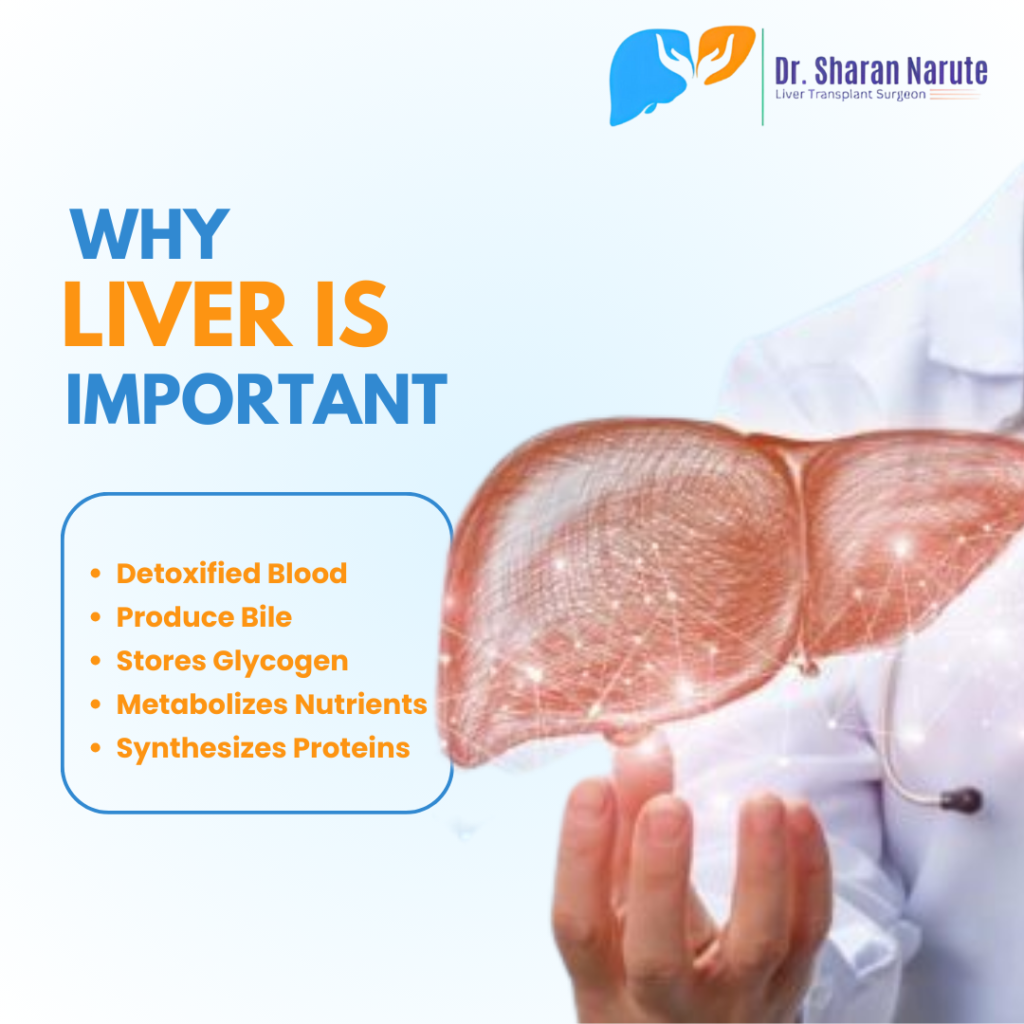The liver is one of the most vital organs in the human body, responsible for a wide range of essential functions that support overall health. It plays a key role in metabolism, detoxification, digestion, and immunity. Given its crucial functions, maintaining liver health is of utmost importance. If liver complications arise, consulting a Liver Specialist in Pimpri Chinchwad is essential for proper diagnosis and treatment. Discover why the liver is important, its vital functions, common diseases, and tips for maintaining liver health with expert guidance.
Functions of the Liver
1. Metabolism and Energy Regulation
The liver is the body’s metabolic powerhouse. It processes nutrients from the food we eat, converts them into energy, and stores essential vitamins and minerals. It regulates glucose levels by storing excess sugar as glycogen and releasing it when needed. This function is crucial for maintaining stable blood sugar levels and preventing metabolic disorders such as diabetes.
2. Detoxification and Waste Removal
One of the liver’s primary roles is detoxification. It filters toxins, chemicals, and waste products from the blood, ensuring they are eliminated from the body. The liver neutralizes harmful substances such as alcohol, drugs, and metabolic byproducts, converting them into non-toxic compounds that are excreted through urine and bile.
3. Bile Production and Digestion
The liver produces bile, a digestive fluid essential for breaking down fats in the small intestine. Bile helps in the absorption of fat-soluble vitamins such as A, D, E, and K. Without sufficient bile production, digestion and nutrient absorption become inefficient, leading to various digestive issues.
4. Blood Clotting Regulation
The liver produces essential proteins required for blood clotting. Without these proteins, even minor injuries could result in excessive bleeding. People with liver diseases often experience clotting disorders due to reduced protein synthesis.
5. Immune System Support
The liver plays a crucial role in immune function by removing bacteria, viruses, and toxins from the bloodstream. It produces immune factors and helps regulate inflammation, protecting the body from infections and diseases.
Common Liver Diseases
1. Fatty Liver Disease
Fatty liver disease occurs when excess fat accumulates in liver cells. It is commonly associated with obesity, excessive alcohol consumption, and metabolic syndrome. If left untreated, it can lead to liver inflammation and scarring.
2. Hepatitis
Hepatitis refers to liver inflammation caused by viral infections (Hepatitis A, B, C), excessive alcohol consumption, or autoimmune conditions. Chronic hepatitis can lead to liver damage, cirrhosis, and liver failure.
3. Cirrhosis
Cirrhosis is the result of long-term liver damage, where healthy liver tissue is replaced with scar tissue. This scarring impairs liver function, leading to complications such as jaundice, fluid accumulation, and increased risk of liver cancer.
4. Liver Cancer
Liver cancer, or hepatocellular carcinoma, is one of the leading causes of cancer-related deaths worldwide. Chronic liver diseases, viral infections, and excessive alcohol consumption are major risk factors for liver cancer.
Tips for Maintaining a Healthy Liver
1. Follow a Balanced Diet
Eating a healthy, nutrient-rich diet supports liver function. Include plenty of fruits, vegetables, whole grains, and lean proteins. Avoid processed foods, excessive sugar, and unhealthy fats that contribute to fatty liver disease.
2. Maintain a Healthy Weight
Obesity is a significant risk factor for liver disease. Engaging in regular physical activity and maintaining a healthy weight reduces the risk of non-alcoholic fatty liver disease (NAFLD).
3. Limit Alcohol Consumption
Excessive alcohol intake can lead to liver inflammation, fatty liver disease, and cirrhosis. Drinking in moderation or avoiding alcohol altogether can help protect liver health.
4. Stay Hydrated
Drinking plenty of water aids in digestion and helps the liver flush out toxins efficiently.
5. Avoid Harmful Substances
Certain medications, herbal supplements, and toxins can damage the liver. Always consult a Liver Specialist in Pimpri Chinchwad before taking any new medication or supplement.
6. Get Vaccinated
Vaccinations for Hepatitis A and B can protect against viral infections that cause liver damage.
7. Regular Health Check-ups
Routine liver function tests and medical check-ups help in early detection and prevention of liver diseases. If you experience symptoms such as persistent fatigue, yellowing of the skin (jaundice), or abdominal pain, consult a Liver Specialist in Pimpri Chinchwad for proper evaluation.
When to See a Liver Specialist
If you notice signs of liver dysfunction, such as:
- Chronic fatigue
- Jaundice
- Loss of appetite
- Dark urine
- Unexplained weight loss
It is crucial to seek medical attention immediately. Early diagnosis and intervention can prevent severe complications.
Conclusion
The liver is essential for maintaining overall health, playing a key role in metabolism, detoxification, digestion, and immune support. Adopting a healthy lifestyle, avoiding harmful substances, and seeking timely medical care are crucial for liver health. If you have concerns about liver function or experience symptoms of liver disease, consulting a Liver Specialist in Pimpri Chinchwad can help ensure proper diagnosis, treatment, and long-term liver health.

